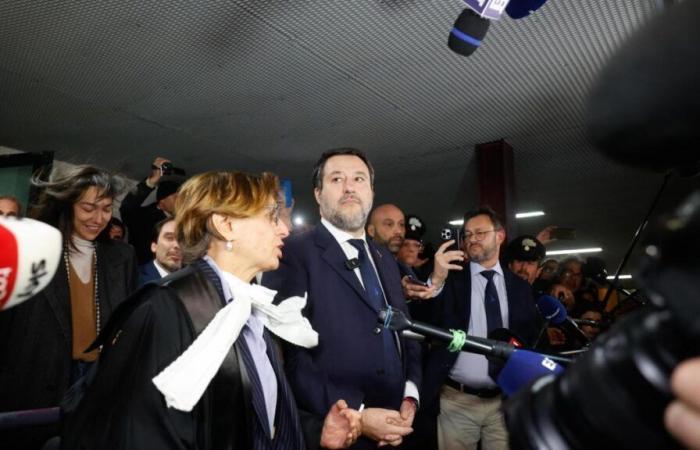
Of
Giovanni Bianconi
Why was Matteo Salvini acquitted in the Open Arms trial? From the judges an opposite approach compared to the prosecutors
L’applause composed but convinced with which the Northern League patrol escorting its leader greeted the sentenceunderlines the success of a defense that has always been political and technical at the same time. With the inevitable intertwining of the two aspects. The formula chosen by the court to acquit the accused Matteo Salvini — «because the fact does not exist» — allows us to say, pending the reasons, that the judges have accepted the lawyer-senator's thesis Giulia Bongiorno. With a double possibility. On the one hand, on a strictly legal level, neither the refusal of official documents nor kidnapping, the two contested crimes, were committed.
On the other hand, the failure to grant disembarkation authorization in August 2019 147 migrants detained on board the Open Armsfu un political act of the Minister of the Interior who pursued the government line a Lega-Five Star majorityand therefore unquestionable on a criminal level.
The exact opposite of the prosecutorswho instead challenged Salvini's denial of a due administrative act, contrary to international conventions and to Italian laws. Carried out obstinately for reasons of pure electoral propaganda by the Northern League leader.
The judges did not believe this version. We still do not know which of the defense theories they espoused, but they certainly did not believe that the then Minister of the Interior was obliged to grant the Pos (place of safety, safe haven) as the last act of the rescue operations carried out by the Spanish ship Open Arms. “The granting of the POS is not the exercise of a power but the fulfillment of a duty”, the prosecutors had said in the indictment.
It remains to be understood why the judges thought differently; whether they believed in full the reconstruction of the lawyer Bongiorno, complete with all its judicial and political annexes, or only in some technical considerations sufficient to make evaporate the hypothesized crimes.
Certainly the court did not decide based on its own political convictions, although many political aspects were included in the judicial matter. First of all the one highlighted by Bongiorno in conclusion of his rejoinder: «A conviction would mean legitimizing the instrumental use of migrants to fight an unwelcome political line», he said. Claiming that it was the Spanish NGO that kept them segregated while the ship was “loitering” at sea instead of heading towards the open Spanish ports, to blackmail the Italian government. Contrary to what was stated by the commander and reiterated by the prosecutors on the fact that leaving from Lampedusa was too great a risk for the safety of migrants, already in Italian waters and with every right to go ashore.
Behind every legal consideration, politics has always appeared in this process: from the beginning of the investigation to the authorization to proceed granted by the Senate; from indictment until debate, until the last challenge in the courtroom between the prosecution and the defense. Both in the evaluations of Salvini's “motive”, in whatever way one wants to read it, and in the existence or otherwise of thesuspected kidnapping. Also linked to the behavior (allegedly political, according to the defense) of those who wanted to bring refugees to Italy at all costs, despite the government ban.
«Defending borders is never a crime», comment Salvini and his government allies, but it is not at all obvious that this conclusion can be drawn from the sentence. Because in any case, even if we consider those 147 castaways a danger, there are always rules to respect. Salvini did not violate them, the court ruled, but they are there. And it is presumable that they will be invoked in a judicial match which will probably have a sequel in appeal and in the Court of Cassation.
It remains true, however, that the Open Arms affair is different from the others that characterized the year spent by the Northern League leader at the Interior Ministry, between 2018 and 2019, brandishing the banner of «closed ports».
«This case is unique – repeated the deputy prosecutor Marzia Sabella before the court entered the council chamber — because only here was the entry ban rooting the extraterritoriality of Italian jurisdiction, only here iTar intervened by suspending that decree, only here did the ship more than legitimately enter Italian waters authorized by the administrative judicial authority, only here did the juvenile court put the Minister of the Interior in default, only here did the Prime Minister highlight that there were no political, legal and European strategy reasons for not allowing migrants to disembark, only here had redistribution taken place, only hereThe Lampedusa hotspot was freeonly here there were no public order or public health reasons to balance, only here the ship was no longer in a position, after 20 days of navigation, to return to sea and go elsewhere”.
For these reasons in this case we have reached a hearing, starting a procedural dialectic which – despite what may be said – remains physiological. From which it emerges once again, beyond the propaganda, that the distinction between prosecutors and judges is already a realityin which the former propose a thesis and the latter verify whether it is founded or not. And it doesn't mean that the separation of careers, with a separate and distinct body of prosecutors in the residual role of “prosecution lawyers”, help to make it work better.
Go to all the news of Rome
Subscribe to the Corriere Roma newsletter
December 21, 2024
© ALL RIGHTS RESERVED





